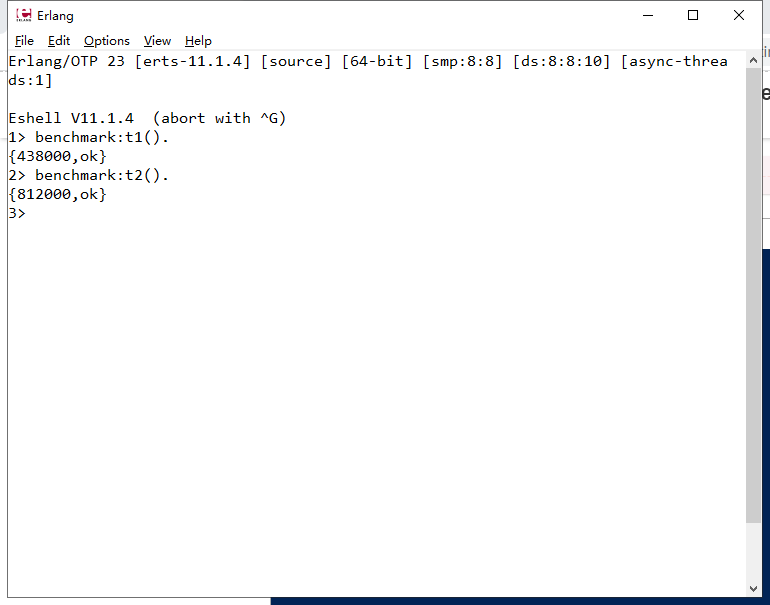On linux
erlang:universaltime_to_posixtime(erlang:localtime_to_universaltime(Datetime))
slower than
Seconds = calendar:datetime_to_gregorian_seconds(Datetime), Seconds - 62167219200 - TimeZone * 3600
But on Windows, the first function is faster than the second, I looked at the source code, but I don’t know why the first function is slower
Erlang/OTP 22
4 Likes
Hello!
Can you post the code you use to benchmark? I don’t know why it behaves that way, but maybe I can find out.
3 Likes
-module(benchmark).
-export([t1/0,t2/0]).
t1() ->
DateTime = {date(),time()},
Fun = fun(_) -> erlang:universaltime_to_posixtime(erlang:localtime_to_universaltime(DateTime)) end,
timer:tc(lists,foreach,[Fun,lists:seq(1, 1000000)]).
t2() ->
DateTime = {date(),time()},
TimeZone = 8,
Fun = fun(_) -> calendar:datetime_to_gregorian_seconds(DateTime) - 62167219200 - TimeZone * 3600 end,
timer:tc(lists,foreach,[Fun,lists:seq(1, 1000000)]).
On Windows
On Linux
The hardware of the two computers is quite different, we just need to see the test results
1 Like
When running the same benchmark on my windows and linux machines I get that t2 always is faster than t1.
I don’t know why the Windows machine that you run on is slower for t2.
2 Likes
Several of my friends ran the above benchmark and got results similar to mine. What I don’t understand is what makes t1 slower than t2
2 Likes
-module(benchmark).
-export([t1/0,t2/0, t3/0]).
t1() ->
DateTime = {date(),time()},
Fun = fun(_) -> erlang:universaltime_to_posixtime(DateTime) end,
timer:tc(lists,foreach,[Fun,lists:seq(1, 1000000)]).
t3() ->
DateTime = {date(),time()},
Fun = fun(_) -> erlang:localtime_to_universaltime(DateTime) end,
timer:tc(lists,foreach,[Fun,lists:seq(1, 1000000)]).
t2() ->
DateTime = {date(),time()},
TimeZone = 8,
Fun = fun(_) -> calendar:datetime_to_gregorian_seconds(DateTime) - 62167219200 - TimeZone * 3600 end,
timer:tc(lists,foreach,[Fun,lists:seq(1, 1000000)]).
- I modified the test code and the test results are as follows
Blockquote
Erlang/OTP 25 [erts-13.0] [source] [64-bit] [smp:4:4] [ds:4:4:10] [async-threads:1] [jit:ns]
Eshell V13.0 (abort with ^G)
1> benchmark:t1().
{27143,ok}
2> benchmark:t2().
{92850,ok}
3> benchmark:t3().
{1462271,ok}
4> os:cmd(" cat /etc/redhat-release").
“CentOS Linux release 8.5.2111\n”
this Centos is started in Docker
Judging by the test results , This is slow because of the function Erlang :localtime_to_universaltime/1 , I’ve been looking at some of the code and I don’t really understand why it’s so slow
2 Likes
Doing a conversion to localtime ends up as a call to localtime_r on Unix and FileTimeToLocalFileTime on Windows. Those calls can take a lot of time, especially compared to what datetime_to_gregorian_seconds does as that is just some math, while localtime_r may end up having to fetch what the current localtime is from the filesystem.
3 Likes

